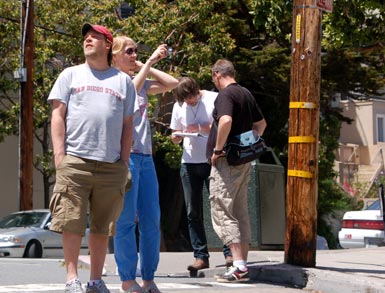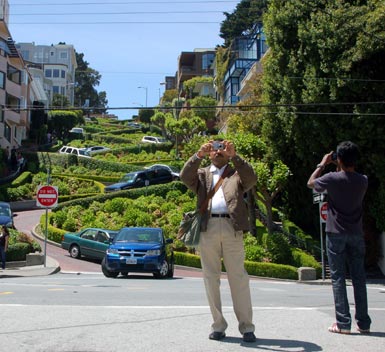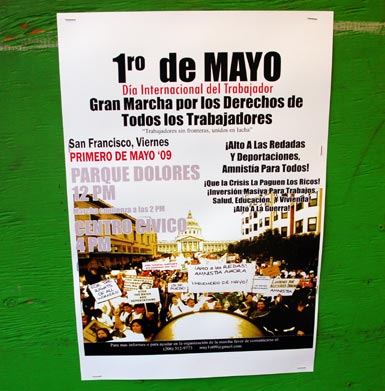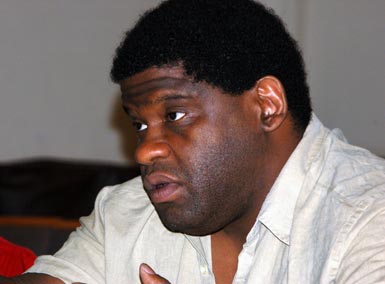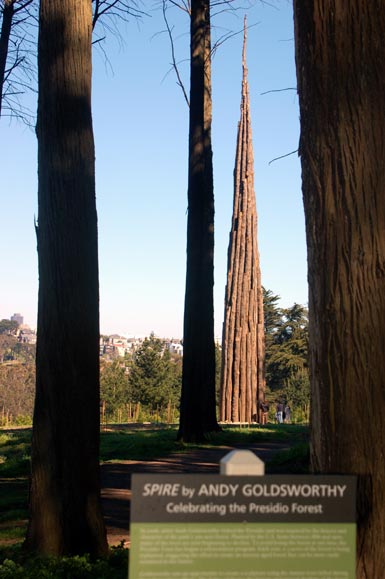 These Obama votive candles* are readily available in my neighborhood.
These Obama votive candles* are readily available in my neighborhood. This is the week we get to drown in "100 days" assessments of the new guy. I could do one myself, but I'm more interested in assessing us, the citizens. How are we doing at interacting with, responding to and influencing the new administration?
That is our job, after all. In this democracy, we didn't elect a miracle worker or a king, just a U.S. politician. He may be the most intellectually broad, most politically agile, and generally interesting one most of us have ever seen, but he is also the guy we put in office. Our responsibility didn't end when we marked our ballots. So how are we doing?
Many of us are probably just hoping he is doing his job (whatever we think that is; most likely trying to keep our jobs from going down the drain). That attitude can't be a crime. People participate in politics in a democracy mostly in order to keep things from going so sour that they have to participate more. And there is
reasonably objective evidence that, despite a seriously worsening economy, many of us think the country is doing better. In December some 70 percent of us thought we were on the wrong track; that's down to something close to 50 percent now.
But how about the fraction of us who think we have to participate all the time on various issues? How are we doing?
On the economy and finance: On this core concern, there have been several levels of citizen effort to have our say. People are mad; we know we have been
and are being ripped off by the financial sector through everything from credit cards to bank fees to the bailout with our taxes. The Right's noisy infrastructure for disseminating resentment has had some success in co-opting the push back via its nasty nativist Tea Parties. Not enjoying the same media megaphones, such left efforts as
ACORN's foreclosure resistance, haven't commanded the same attention. Meanwhile, just about every publically vocal academic expert on high finance -- Krugman, Stiglitz, Galbraith, Reich, Johnson and Kwak among others -- has charged the stimulus with being too small and the bailout with being inadequate and wrongly executed. The Administration says "we're doing what we can" and
spins. We the people get a
C for effort; academics get a
B for at least creating the need for a response from our rulers.
On war and peace: The urgent need to replace the Republicans took any wind we had out of the sails of those of us who have worked against the Iraq war. And we ourselves have been very tardy at coming to grips with escalation in Afghanistan, with the continued refusal of our rulers to deal with the festering sore of Israeli oppression of the Palestinians, and with U.S. military might spread across the globe, including the still-escalating war budget. Some of the usual suspects, including
Code Pink and
UFPJ, have tried to keep a peace movement alive. Commentators including
Get Afghanistan Right have tried to lay the intellectual groundwork for the moment when people here notice we're embroiled in another disastrous occupation in Central Asia. Probably the best news on that front is
the testimony of veteran Marine Cpl. Rick Reyes in a hearing last week. As usual, it is going to take people in the U.S. feeling the damage caused by our wars to get their attention. For these reasons, we applaud the fact that we have a President who seldom embarrasses us when he goes abroad, gives us reason to hope he's leaving a trashed Iraq to sort itself out, and doesn't cheer atrocities. We're pretty pathetic world citizens:
D- in consideration of the faint stirrings in the embers.
On the torture and the rule of law: The usual suspects -- civil libertarians, investigative journalists, competent security professionals and parts of the legal profession -- are squawking like mad about issues on this front. Adam Server has written
a convenient scorecard on the multiple rule of law issues the Obama people have confronted -- and frequently flunked. What's hard is to know is how large a constituency cares about these matters. The conventional wisdom is that nobody cares, to the extent of
writing false headlines for polling results that show that substantial majorities of the people want some kind of accountability, some combination of prosecutions and/or investigations. (H/t
Jim White and the indefatigable
Glenn Greenwald.) It's possible to watch the administration gyrate to deflect unwanted calls for fast action from multiple directions. Just possibly the people, quite a few of whom in this instance are somewhat elite people, are pushing the new president around a bit. Give us (and the Prez) a
B- so far. Time will tell...
On promoting the general welfare: This is the category that encompasses what most of us, except elites, think is the legitimate work of government: setting the rules and policies that enable the society to function -- the core stuff like health care, labor rights, full civil rights for all, educational opportunity. For historical reasons, we're not as good agitators for our own welfare as we need to be. Since 1980 we've pretty much been on the defensive, trying to prevent a series of robbers and con artists from completely dispensing with a frayed social contract. And we've evolved institutions suited for this kind of playing defense: single-issue, technocratic, professional advocacy groups, usually headquartered in Washington, whose idea of an involved activist base is, at best, a large set of individual donors. This kind of institution has a difficult time adjusting to new political circumstances, to a friendly context outside the experience of all but their oldest leaders. Meanwhile, most of us have gotten used to be being grateful that someone else specializes in understanding health financing or school testing policies; we have learned to abdicate any activist impulses to the pros. For an administration attempting substantive initiatives toward some kind of universal health care and investment in educational quality, these outfits won't serve -- the Obama folks need a mass social movement behind them. Instead they have non-profit silos. Obama for America looks designed to fill some of that void -- but can the person in power also serve as the focus for a movement? On the tough general welfare policy front, I grade the citizens a
D.Two sectors deserve slightly better marks. Labor has a real membership and substantial political capacity demonstrated in multiple elections. But after years of being hamstrung by labor law that turned insurgents into bureaucrats, it hasn't yet shown it can rouse its members to make fierce demands on a friendly government. Labor gets a
C+. The LGBT movement is riding an historical wave of change in gender assumptions that give it a rapidly growing base among the new administration's core constituencies. And Obama inadvertently taught it to fire warning shots across his bow before he was even inaugurated (the Rick Warren episode). There's struggle ahead, but give LGBT forces a
B+.
On sustainability of the planet: As Elizabeth Kolbert wrote in this week's
New Yorker, ... Earth Day has lost its edge and, with that, the sense that a different world is possible. Even more than in 1970, what's needed now is an outpouring that organizes itself -- with millions of people and, for good measure, some stinky dead fish in the streets.
The Pew Research Center found that, in the week Obama was inaugurated, concern about global warning had slipped to dead last among 20 policy problems. We, the citizens, can't seem to get interested. Some of the problem is like that with the other policy matters: it all seems incomprehensibly technical, impossible for otherwise responsible people to get involved with. And too many of us have the sneaking suspicion that probably it is all hopeless anyway -- the planet is going to fry and all we can do is mitigate and/or try to get ours. But Kolbert's right; we need to find hope that a different world is possible. So far, the people get an F.
For an overall grade, let's give ourselves a C- for Obama's 100 days. Lots of work to do.
***
*About those Obama votive candles: a quirk of my history makes me aware that the saint's body on which the President's head has been grafted belongs to Martin de Porres, a half-Spanish, half-Black African, Dominican brother in 17th century Peru. He was known for his good works for the poor -- and also for being able to "bilocate," to be in several places at once. I'm sure the President would find that ability useful in his job.


